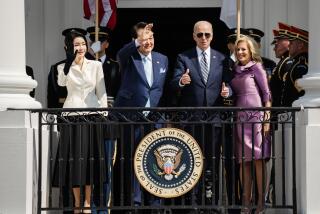U.S. Wants Trade Gains Before a Japan Summit : Diplomacy: Clinton Administration displays new cool stance, suggests concrete steps before Miyazawa visits.
- Share via
WASHINGTON — In a demonstration of the Clinton Administration’s strikingly cool stance toward Japan, American officials have served notice that Prime Minister Kiichi Miyazawa should not expect to meet with the new President until after Japan takes concrete new steps to help ease the massive trade imbalance between the two countries.
Michael H. Armacost, the U.S. ambassador to Japan, told Japanese officials in Tokyo earlier this month that there is no point in Miyazawa’s traveling to Washington for an early get-together with Clinton as long as he has nothing specific to offer.
Instead, the ambassador suggested, Japan should first take some action, such as a tax cut, to stimulate its economy, an action that would boost domestic demand and thus Japanese imports of American products.
White House and State Department officials have confirmed the substance of Armacost’s message and acknowledged that it represents the official American viewpoint.
“They (the Japanese) understand that just having Miyazawa come to say hello, without having anything to offer, is not productive,” said one State Department official.
The delay is also aimed at helping give the new Administration time to work out what one American official termed “a fundamental reshaping of the way we approach Japan.”
The decision to have Clinton keep Japan at arm’s length in the early days of his Administration represents a dramatic change from the Reagan and Bush administrations.
In 1989, then-Prime Minister Noboru Takeshita arrived for a White House dinner with President Bush on Feb. 1, less than two weeks after Bush was sworn in. Four years earlier, President Reagan met with Prime Minister Yasuhiro Nakasone on Jan. 2, well before Reagan’s second inauguration.
Japanese officials are making little effort to hide their irritation with the American pressure to have Miyazawa bring something tangible to Clinton.
“In my own personal opinion, I think whether the prime minister comes or not should not depend on specific policies,” said Hiroshi Hirabayashi, the second-ranking diplomat at the Japanese Embassy in Washington. The purpose of a Miyazawa visit, he said, would be to “say hello to Mr. Clinton . . . and to promote the global partnership we have been pursuing for several years.”
But Japan also has shown some signs that it may try to respond, at least to some extent, to the American pressure. Last week, Chief Cabinet Secretary Yohei Kono told reporters in Tokyo that the Japanese government might consider approving some new economic proposals to present to the United States, if Clinton will agree to a meeting.
Japan recently reported that its trade surplus with the United States last year was more than $40 billion, far higher than the U.S. imbalance with any other country.
During their confirmation hearings, both Secretary of State Warren Christopher and U.S. Trade Representative Mickey Kantor made it plain that the new Administration will give a high priority to economic concerns in dealing with Japan.
“We . . . have an obligation to America’s firms and workers to ensure they are able to benefit from the growth of Japan’s economy, just as the strength and openness of the U.S. economy has helped fuel Japan’s prosperity over many decades,” Christopher declared.
Within days after Clinton’s election last November, Japanese officials began suggesting that Foreign Minister Michio Watanabe would be coming to see Clinton in early January and that the prime minister would probably visit the new President by February. Miyazawa himself told a December news conference that he hoped to visit Washington soon after Clinton’s inauguration, and Japanese newspapers even mentioned a date of Feb. 11.
Now, those dates for early visits have been quietly shelved.
Both American and Japanese officials say the Japanese prime minister might call on the White House around April--a date by which, U.S. officials pointedly note, the Japanese Parliament will have had time to approve a new budget for the next fiscal year with some sort of program to stimulate Japan’s economy.
Both American and Japanese officials say it is important for the new President to meet the Japanese prime minister some time this spring to lay the groundwork for a Clinton trip to Japan this summer.
The annual gathering of the heads of government of the world’s seven leading industrial powers will take place in Tokyo beginning July 7. While the summit will be devoted to international economic policy, Clinton’s transpacific trip to attend it will probably help set the tone for his Administration’s relations with Asia in general and with Japan in particular.
While Washington and Tokyo continue to try to coordinate foreign policy with one another, the two governments find themselves at odds over a number of issues. Besides continuing economic and trade frictions, differences also have emerged in the two countries’ policies toward Russia and China.
More to Read
Sign up for Essential California
The most important California stories and recommendations in your inbox every morning.
You may occasionally receive promotional content from the Los Angeles Times.










